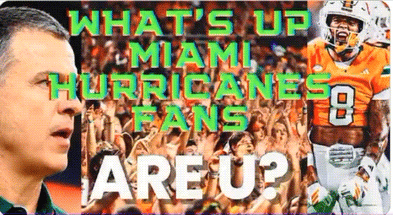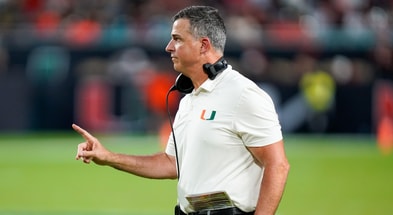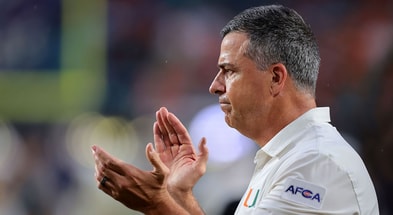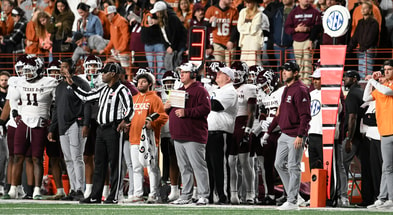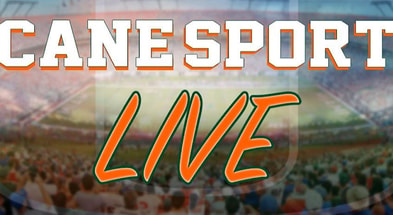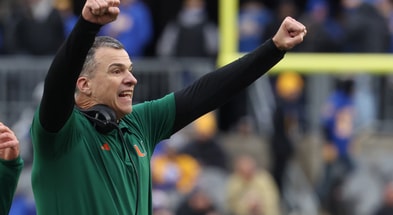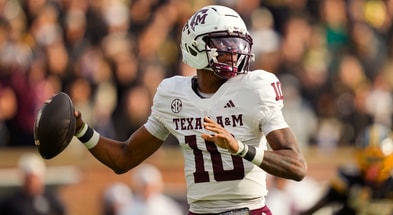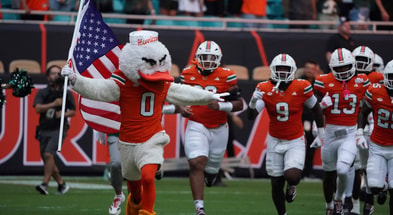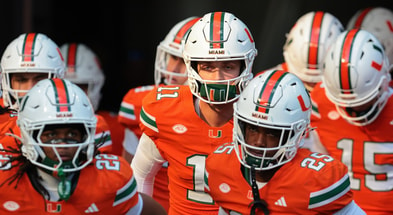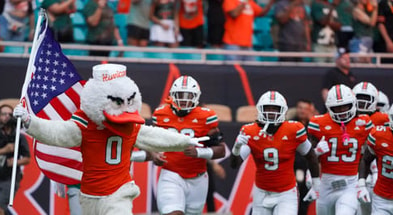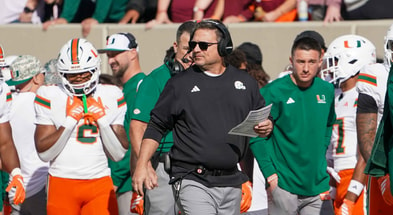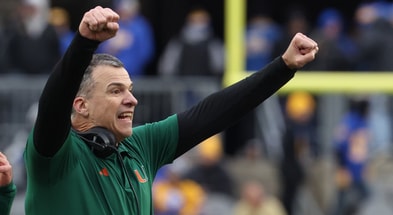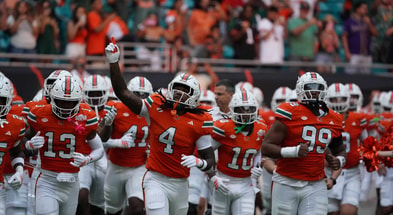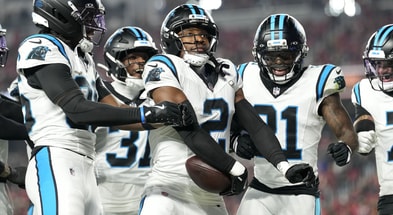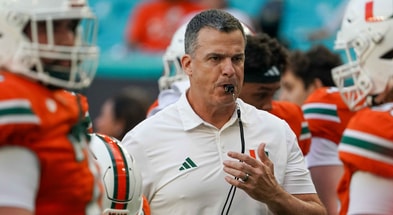Hurricanes coach Mario Cristobal says Miami is getting "best version" of Carson Beck as a talented team-first player, excited about progress of program
The very unofficial start of the season is here for Miami Hurricanes fans. And by that we mean the ACC’s Media Day. Because today, with fall drills coming up fast, we got our first “real” insight into the team’s offseason progress.
And to hear coach Mario Cristobal tell it, everything is pointing in the right direction off a 10-win 2024 season in which Miami was oh-so-close to a playoff berth.
Cristobal pointed to taking that “next step” today at ACC Media Day.
“Take that next step as a team so we can play for championships and win championships” Cristobal said. “It’s all about the starting point. Upon arrival I remember sitting on a tarmac waiting and we had one draft pick in the seventh round. You fast-forward three years later, No. 1 overall pick, seven drafted. And we project to be better over the next couple of years. It’s progress. There’s a hunger and drive where it’s never going to be enough. The expectation of being a Hurricane, your internal expectations, mind and heart are always going to be greater than anything outside. We can’t wait to get to fall camp.”
Can Carson Beck Bounce Back? Miami Hurricanes Season Hinges on His Arm and Leadership … “I’m feeling really good” … Miami Hurricanes OL Francis Mauigoa Vows to Protect Carson Beck: `I’m Not Letting Anyone Touch Him’ … Miami Hurricanes LB Wesley Bissainthe: “We’re Focused on Building Our Identity” … sees Mohamed Toure ready “to step up bigtime” … Akheem Mesidor Confident in Revamped Miami Hurricanes Defense: “We Can Be Special” … Can Carson Beck Silence Critics? Miami Hurricanes QB Readies for Redemption This Season
Notre Dame, of course, is just over a month away.
“Everyone is talking about it, but we’re making sure we are focused on (Miami),” Cristobal said, adding “We’re really excited and I’d say the most exciting part about our team is the dominant trait of a bunch of guys that love to work. We have signed and developed an incredible group of players form the high school level to the portal method and have brought in some really high level coaches and human beings tot help the upward trajectory of our program.
“There is a ton of energy around our program right now.”
Cristobal also stressed today that a big part of training camp that starts July 31 will be mental toughness that allows the team to start and end the season strong.
“It’s how you finish,” Cristobal said. “We’ve made a lot of progress over the last three years. Year 1 we weren’t really built to take on (strong teams). Year 2 every game was competitive. Last year we had a chance to win every single game but we didn’t. The bottom line is we didn’t get it done. You know what else fell apart the end of the year? Ball security. Without a doubt, finishing is a mentality, a work ethic that comes with the off-season.”
Certainly this is a team with plenty of talent.
And that starts with top QB arrival Carson Beck on offense. The Georgia star dealt with off-season UCL surgery but is back looking very much the part of a top signal caller. Cristobal says Beck is “hungry and driven” and focused on “Making Miami better.”
“Carson has as good as experienced a quarterback as you can have,” Cristobal said. “He’s played in monster games and at a high level. He is ultra competitive and his IQ is off the charts. It didn’t take long to realize he’s a team player.
“Carson has done an outstanding job since the moment he arrived at Miami. In spring ball he was limited, didn’t get to do much. Within a week and a half or two after spring ball he’s been full go and has participated fully in everything we’ve done. Tremendous competitor, accurate arm, strong legs, strong runner, excellent human being. We feel we’re getting the best version of Carson Beck.”
Cristobal also added of Beck that he has a “super high football IQ, his arm is unbelievable but he has great legs as well, he can run, is a powerful runner. His knowledge of the game, work ethic and he’s a great teammate, naturally draws people to him. Very charismatic personality, in a quiet way but way that draws the team to him.”
As for the naysayers with Beck?
“You talk about everything you can to make sure the head and mind are clear,” Cristobal said. “But you don’t really care about that. Anything said outside the walls of the program – here’s a guy really motivated that won a ton of games. Last year this time Carson was projected the number 1 quarterback in the draft and Cam Ward was fifth round. A lot of things can happen. … Carson is 100 percent focused on making Miami better.”
Cristobal says he thinks Beck is in a good spot to help the team continue its high level of play even with Cam Ward gone. Will the style of play change a lot with Ward no longer here?
“Carson is unlimited, limitless in his abilities,” Cristobal said. “Last year what was underrated was our ability to run the ball, we were No. 4 in the country in yards per carry. We really trust Carson, are excited about the skill positions as well. The identity, we’ll establish that in fall camp. Whatever allows us to score the most points, play complementary football, that’s what we’re going to do.”
Good news for Beck? He’s got some really good protection with four starting linemen return, and a fifth starter is transfer arrival/TCU starter James Brockermeyer. Cristobal called the line “tough and committed.”
Cristobal says he thinks this line can be better than last year’s.
“Any time you have an offensive line that can perform at a high level you’re going to have a chance to win a lot of games,” he said. “We feel we can field an offensive line that can field 8-10 guys that can play winning football. We’re going to find out in fall camp. We’re big, physical, our strength room numbers have been off the charts. It’s a hungry, driven group. They know we are driven by the trenches, both the offensive line and defensive line.”
The running backs have a solid duo in Mark Fletcher and Jordan Lyle. Fletcher has started games the last two years, and Miami also added power back CharMar Brown in the second portal window.
The big losses on this side of the ball are at WR and TE, with the top five statistical guys all gone.
But TE Elija Lofton is expected to be a breakout performer taking over for Elijah Arroyo, and at receiver there are depth question marks but JoJo Trader could be a future star with all kinds of potential. The team also added CJ Daniels, Keelan Marion and Tony Johnson in the transfer portal.
Cristobal stressed that Daniels in particular has “taken on a leadership role.
“I see a group with a chip on its shoulder and a lot to prove,” he said. “We do feel very confident that group is up to the task.”
Plus young guys like slot Malachi Toney flashed in the spring and could play major roles.
“Confident in both those positions (TE and WR),” Cristobal said. “Guys that have been here, just arrived have proven in practice they are worthy, can make the necessary plays, can make adjustments on the run, are mentally and physically tough enough to handle what we do. In five plus weeks we feel confident they will be in a position they can be successful at a really, really high rate.”
As for Toney’s potential?
“He’s a special talent, special young man,” Cristobal said. “He has really made some impressive plays and has shown some maturity that you don’t often see from a guy his age. Gets there early in the morning, works on the JUGS, works on route running. A lot of promise there, really excited about what he’s going to be, and sooner rather than later. … We’re excited about him.”
On defense this was a unit that struggled a year ago, allowing 30 or more points in five of eight ACC games. But with an almost all-new defensive staff headed by coordinator Corey Hetherman, plus several key transfer arrivals, the hope is that side of the ball will be solid.
As for the defensive personnel? Well, DL Akheem Mesidor and Rueben Bain are proven playmakers, and the team added DT David Blay out of the portal after he starred at Louisiana Tech. A young guy like DT Justin Scott or key depth piece like DT Ahmad Moten will be among those helping solidify the interior. And younger guys like ends Armondo Blount and Hayden Lowe are ready to break out in support roles.
“We have depth, versatility, powerful guys, guys that can knock people back and stop the run and guys that can affect the quarterback,” Cristobal said. “When you have versatility you can move guys around, make it more difficult for offenses to get a beat on what you’re doing.”
At linebacker there is a question mark at MLB with Francisco Mauigoa gone, but the team has back Wesley Bissainthe as a two-year starter and added a potential star in Rutgers’ Mohamed Toure. Two years ago Toure had 92 tackles and 4.5 sacks while playing under then-LB coach Corey Hetherman, and the hope is he can be back to form after missing last season with a torn ACL.
Miami also picked up NC State starting LB Kamal Bonner (can play MLB or OLB) and has guys like Bobby Pruitt, Raul Aguirre and others hoping to step up.
“Our linebackers are bigger, more depth there as well,” Cristobal said. “We feel we have a really good front seven.”
The secondary struggled a year ago with busts and confusion, but Cristobal has added several new portal pieces with CB Xavier Lucas, nickel Keionte Scott and safeties Zechariah Poyser and Jakobe Thomas expected to start out of that group.
A returning starter is CB OJ Frederique, who had an outstanding freshman season.
“We had to really revamp the secondary, did not do a good enough job recruiting talented guys and depth at that position (last year),” Cristobal said. “We got guys that can come in and make an impact right away.”
So what will be different on defense this year under Corey Hetherman?
“It’s not just about talent, it’s about the demeanor of that side of the ball,” Cristobal said. “It’s about getting that side, the offensive side, special teams to play together. It starts up front and the use of personnel. What coach Hetherman does from a schematic standpoint, philosophically from being aggressive, putting pressure on the offense, making quarterbacks uncomfortable, making sure tendencies aren’t honed in on – he’s a guy that can mix it up, not compromising the physicality necessary to play great defense.”
Overall is this team more balanced than a year ago when the offense carried Miami?
“Every year, it’s almost nowadays with the amount of turnover, you’re coaching a one year team,” Cristobal said. “We threw the ball really well last year, but we were No. 4 in the country in yards per carry. So when we pounded the ball we were high level. And you’re never going to handcuff a guy like Cam Ward. But that was a balanced offense. Defensively we took a downhill turn and certainly didn’t recover. Addressing that is personnel and coaching and technique and fundamentals and its culture. Our expectation and our work has been geared toward bringing both sides together to play at a really, really high level. That part has to be different.
“I feel we have more balance because we have more experienced depth.”
You add up all the above and you can see why Cristobal has high hopes for the coming year.
“We have a good idea going in (to camp the depth chart), but we want to validate performance every single day,” he said. “It’s an exciting time and ton of momentum.”
*Asked about Canes Connection and the House settlement, Cristobal said, “We’ve always been very well established, been compliant and aggressive in the right kind of way, use it in the form and fashion that benefits our program and players.”
*Cristobal said that backup OL Samson Okunlola “is having an unbelievable off-season, you’re going to see some great work out of him.”
*Cristobal stressed that having former players come back on campus is “critical,” as is getting recruits on campus.
“I remember being in high school and finding a way to get to practice,” he said. “I wanted to see a Danny Stubbs and a Jerome Brown battle with a Gregg Rakoczy and a Matt Patchan. I wanted to see Michael Irvin go against Bennie Blades. Those guys were on the sideline when we were getting recruited, and that was a big draw for coming to the University of Miami.”
*Cristobal said he’s in favor of expanded playoffs but not automatic bids where teams might, as he puts it, “Stink.”
*As for if there should be a salary cap in college football? “I think everyone wants some form of consistency, clarity and we’re not there yet,” he said. “It’s adapt or die.” Cristobal added that “there’s a lot of work to be done” on the issue.
MARIO CRISTOBAL PRESS CONFERENCE Q&A
MARIO CRISTOBAL: Good morning, everybody. Thank you for being here, and thank you for hosting us. I want to first thank, an honor to be here with our players, with Carson, with Akheem, with Sisi, affectionally known as Francis Mauigoa, and Wesley Bissainthe, as well. These guys exemplify what a University of Miami student-athlete and competitor is all about.
We’re really excited, and I would say the most exciting part about our team is they have the dominant trait of being a group of guys that love to work, and you can’t throw enough at them. They still manage to get all that work done while being great students, achieving the highest GPA they’ve achieved successively for seven straight semesters, as well as leading the country in community service hours. So we’re growing both as people and as players, but we signed and developed an incredible group of players in different forms and fashion, from the high school level to the portal method, and have brought in some really high-level coaches and human beings that we are really excited about that have certainly helped us continue the upward trajectory of our program.
And that being said, there’s just a ton of energy and momentum surrounding our program right now, and our excitement is geared towards the fact that we get to start football fall camp, training camp, and get in there and really just be focused on our team to establish our identity, to improve our technique and fundamentals, get in the best shape that we possibly can to master our systems inside and out, name it, to get better at everything we do.
That being said, appreciate being here, and open to questions.
Q. Canes Connection, the NIL collective, I know you spoke about that pretty openly, the collectives in the beginning of NIL. Just what you can say about where Canes Connection is in the grand scheme of the House settlement and how you work that all together, and Miami’s NIL situation moving forward?
MARIO CRISTOBAL: Well, we’ve always been very well established. We’ve always been compliant and we’ve been aggressive in the right kind of way and used it in a form and a fashion that benefits our program and our players.
In terms of where they are and all the details surrounding all of that, that’s maybe a question for some other time, but you couldn’t find a more professionally run organization than our collective.
Q. You hired four new defensive assistant coaches in this off-season and you only have one returning. What went into that hiring process, and what are you expecting from them this season?
MARIO CRISTOBAL: Sure. Well, into the hiring process, we certainly, after week 4 last year, we took a downturn. We slipped defensively. I don’t want to blame anybody. I always look at myself and say, what could I have done better? We had some injuries that led to some schematic changes that weren’t the best for our football program, so a change had to be made, and we found a guy in Corey Hetherman. It’s not the fact that he was a highly coveted guy, it’s the fact that he is an elite teacher and human being and a guy that really does really well what we need our defense to do and to be.
His use of personnel, his ability to adapt, his track record and his productivity, particularly last year at Minnesota, was enough evidence for us to feel comfortable in bringing him in, and he hasn’t disappointed.
He brings an elite level of commitment, of work ethic, of teaching capabilities, and he’s complemented by a former Cane, Damione Lewis, working with the defensive line, who is aggressive and has a commanding presence, an excellent football coach, as well Zac Etheridge and Will Harris on the back end. And I also want to mention Terry Jefferson, who’s a local guy who’s worked really hard at Jacksonville State and he’s also joined the secondary group, also.
All in all, we felt like we needed to make some changes in that department, and we made them, and we feel that not only are they the right coaches, they’re the right people, and they’re going to grant us better success.
Q. Did you get your Cuban coffee this morning?
MARIO CRISTOBAL: You know, that’s been a battle here. I think it would be good if I could get some help from the locals. Si alguien habla español, por favor ayudame. It would be greatly appreciated, and I promise to return the favor at a fine dining establishment down in Miami when you guys are down there.
Q. You’ve had some teams in Miami over the last couple years that started the season really strong with some signature victories. Towards the end of the season we’ve seen things start to fizzle out toward the end of the year. Is that something you’ve focused on and talked about, and what are the keys to starting strong and finishing well, as well?
MARIO CRISTOBAL: No doubt, it’s how you finish. We’ve made a lot of progress over the last three years. Year one, our roster was not really built to take on Power 4 football, and those were some lopsided games and those were tough. Year two, everything was competitive and we won a couple more.
Then last year we had a chance to win every single game, but we didn’t. The bottom line is we didn’t get it done. And it’s more than — I know we pointed out the defense a little bit earlier, but you know what also what fell apart at the end, ball security. If you turn the ball over, you subject yourself to some not so positive outcomes. Without a doubt, finishing is a mentality. Finishing is a work ethic that comes with the off-season.
We’ve always invested a ton of effort in those areas, and we’ve invested even more this off-season, and it will be a big part of training camp, as well.
Q. You guys have had a good bit of turnover at the skill positions on offense coming into the season, but you have some talent there and you also brought in some guys from the portal. What have you seen from that group coming into this season?
MARIO CRISTOBAL: Well, I’ve seen a lot of talent and I’ve seen guys that also have a work ethic that is a little bit different in a positive way. We’ve always had hard workers on our football team. These guys seem to take the extra work to a different level. I think Coach Beard has done a very good job, so has Coach Varner, but I think that some of the seniors, some of the older guys like CJ Daniels have taken a leadership role in bringing the guys in before and after the mandatory sessions and getting some extra work in in the form of the film room, in the form of route running and catching the football. And I see a group with a chip on its shoulder and a lot to prove. We see a lot of stuff in practice that you can’t really gloat about out here because you haven’t seen it, and there’s no value in claiming certain things in the off-season.
But we do feel very confident that that group is up to the task, and not only to maintain the standard but to elevate it at some point in time. We’re excited about those guys. We push them hard, and we push them to be just as involved in the running game as they are in the passing game.
Q. You’re having to replace Heisman Trophy winner No. 1 overall draft pick Cam Ward. You brought in Carson Beck from University of Georgia. This is a two-parter for you. One, how is the offense going to shift to more accommodate for Carson based on moving from Cam? And then could you give us an update on Carson’s injury and how he’s progressing and what is his outlook for you guys in the fall?
MARIO CRISTOBAL: Well, we’re thrilled to have had Cam and we’re thrilled to have Carson here now. We never look for the next — like, when we had Justin Herbert out west, we didn’t look for the next Justin Herbert. We were looking for the first Cam Ward, and now we’re looking for the first and best version of Carson Beck. Carson has as good of experience as a quarterback as you can have. He’s played in monster games, and he’s played at a high level.
He is ultra competitive, and his football IQ is off the charts. It didn’t take long to realize that he’s a team player, and that his work ethic is also through the roof.
Even though he missed spring practice, his participation was in a limited manner, but soon after he’s been cleared and he’s been participating and doing everything with our team for several weeks, and that’s a lot of opportunities. Nowadays in college football, guys run their own practices and whatnot, and they get almost like an entire spring session on their own off to the side.
But what we see is, like I mentioned, a high-level elite competitor that has played at a high level, and this is what I think is the best part, that is hungry and driven, not just to establish himself as one of the premier players in the country; he, like Akheem, like Sisi, like Wes, their interest is to make Miami better, to go win.
I think when you combine those things and you combine an offensive line that really prides itself on working hard and protecting and running the ball well and a lot of pieces around it and an improved defense, this is the right place. This is the right time, and these are the right people. I think his relationship with Shannon Dawson and the rest of the offensive staff, particularly the offensive line coach, Coach Mirabal, it’s a tremendous partnership. So we’re looking forward to getting on the field and making it work.
Q. In terms of you and your history as a player, you know what it’s like to win a championship, multiple championships at Miami, and as a coach it’s been a while and it’s been something that’s kind of been since before your time. Miami has had the talent, it’s had the opportunities, but it just seems like a little bit of can’t-get-right-itis, or something like that that is preventative. How does this team take that next step to returning to that glory?
MARIO CRISTOBAL: First of all, I’d say I disagree with you. Miami has had the talent. We got here in 2022, and I remember watching film and saying we’ve got a lot of work to do. And I think this is the best way to put it, to summarize it: We were on a tarmac and we asked the pilot to delay, this is a flight during recruiting and fundraising, where Miami was on the verge of not having a player drafted for the first time in I don’t know how many decades, and the then finally late in the seventh round, a player was selected. So to that statement, to me, Miami did not have the talent and Miami did not recruit to the level that Miami is supposed to recruit. Now you fast forward three years later, Miami is coming off a 10-win season. Now Miami is sixth in the country in players drafted with double digit combine invites, with double digit wins, and with the No. 1 pick overall.
The steady progress and trajectory is a product of a lot of people, players, coaches, staff members working really hard to get Miami to where it needs to be, and one of the biggest reasons, if not the biggest reason, why I chose to leave my place on the West Coast to come back and do Miami the way Miami should be done. That’s what we’ve been doing.
I think it’s evident in the players we have here today. It’s evident in the progression of our football team. It’s evident in the talent acquisition and the development of those players and the way that things are progressing for our program in general, on and off the field. I hope that makes sense, but I think it’s important to paint the picture, because if you want to tell a story, let’s make sure we tell the story from the starting point of what it looked like so we have an accurate depiction for what that story really is.
ACC COMMISSIONER JIM PHILLIPS Q&A
Commissioner Press Conference
JIM PHILLIPS: That was exhilarating. Good way to start Tuesday morning.
Good morning. Welcome to the 2025 ACC Football Kickoff. Let me begin by thanking each of you for attending. We thoroughly enjoy hosting you here in Charlotte for this occasion, as well as the other meetings, championships, and events we hold throughout the year. The Queen City is an outstanding home for the ACC, and please know that our office is always available to you.
On behalf of the entire ACC, our hearts and prayers remain with everyone who’s been affected by the horrific storms and flooding, most specifically in Central Texas, where the loss of life is truly devastating. We will continue to keep the family and friends of loved ones in our thoughts, and I ask that you join me in a moment of remembrance.
(Moment of silence).
Thank you. To see so many media, partners, colleagues, and friends assembled here today is incredibly humbling. You are appreciated, and your attendance, coverage, and support will never be taken for granted.
As I’ve done annually since my first ACC Football Kickoff five years ago, there’s one group in attendance that I’d like to especially recognize. Yesterday I was able to spend time with our ACC Student-Athlete Advisory Committee. If you know me and have followed this league, you know there’s nothing more important than our amazing student-athletes. Please join me in recognizing the representatives from our ACC SAAC, who I asked to stand and are midway back here today.
(Applause.)
They remain the best and brightest student-athletes in the country, I promise you.
Before I look ahead, it’s important to reflect on the past year and what was accomplished both within the ACC and nationally. Beginning last July, and throughout the year, we seamlessly integrated our three newest league members. Our national footprint present in each of the five most populated states and having four of the ten largest television markets will continue to serve the ACC well.
During the 2024 summer Olympics in Paris, athletes from ACC institutions combined to win 102 total medals, the most of any conference, including the highest number of golds. Current and former student-athletes from a total of 13 different schools won at least one medal, and Stanford athletes led all NCAA schools with a school record 39.
The partnership with Disney and ESPN was only further strengthened this past year. Last summer we celebrated the fifth anniversary of ACC Network with a series of media interviews and events in Bristol. Following the celebration on ESPN’s campus, many of us were on the same flight to Ireland for the Aer Lingus Classic, featuring Florida State and Georgia Tech. It was an incredible atmosphere, and having ESPN’s College GameDay, as well as ACC Huddle broadcasting live for the first time outside the United States was absolutely tremendous.
It was also the most watched Week 0 college football game since 2019, and the top game on cable this past season.
Sponsorships were enhanced as two additional partners were secured, including Geico as the presenting sponsor of the 2024 ACC Football Championship Game, and as part of a multiyear agreement through 2027, T. Rowe Price became an official partner of the ACC and as the exclusive title sponsor of the ACC Men’s Basketball Tournament.
At the end of January, in conjunction with ESPN, we announced an extension of our long-term partnership through the 2035-36 academic year. The renewed commitment demonstrated ESPN’s ongoing dedication to the ACC and has accelerated our creative and innovative efforts to drive additional value.
Following the ACC Board of Directors’ endorsement of a competitive success initiative program back in May of 2023, this past year marked the first implementation of the progressive and forward-thinking approach that rewards schools for their competitive success in football and in basketball.
When the initiative was first approved, only football and men’s basketball revenues from national postseason competition were included. However, I applaud our leadership in being proactive by ensuring women’s basketball would be effortlessly integrated when the NCAA D-I membership approved implementation of units back in January.
The legal disputes within the conference were brought to resolution at the beginning of March. The ACC Board of Directors was amazing in its leadership, dedication, and patience through a challenging process. The settlement provides long-term stability for the league with the potential for all members to benefit from additional revenue opportunities.
Leading in the distribution of revenue based on success, and now with an additional revenue distribution model that is based on viewership, the ACC has been innovative in its approach to conference revenues. As part of the modernization of college athletics, these new models allow us to maintain distributions for all ACC members that are above most other conferences while also providing flexibility for competition at the highest level of revenue.
On the playing fields and in the classrooms, our student-athletes and programs continue to shine. The ACC won six NCAA titles this past year and has amassed 29 in the last four years. In that span, no conference has won more NCAA titles in league-sponsored sports. Amazingly, there have been 17 occasions that an ACC team defeated another ACC team in either the NCAA semifinals or the championship over the last four years. Let me just say, this is a killer for the commissioner. It’s the thrill of victory and the agony of defeat all in the same moment.
In addition to our NCAA titles, 12 teams finished their seasons ranked either No. 1 or No. 2 in their respective national polls. Earlier this month, we announced Virginia’s Gretchen Walsh and Duke’s Cooper Flagg were chosen by a select media panel as the top female and male ACC athletes for the 2024-25 academic year. Walsh earned her second consecutive Mary Garber Award as the most outstanding female athlete, a week after winning the Honda Cup as the 2025 Collegiate Woman Athlete of the Year.
Flagg, the consensus Men’s National Player of the Year and the top pick in June’s NBA Draft, earned the Anthony J. Kevlin Award as the Premier Male Athlete.
The nominees for these top league awards were remarkable, especially when you consider the national award winners and Olympic medalists who are on that list. And as many of you noted at the time, this was only the sixth time in history that the No. 1 draft picks from the NFL and NBA hailed from the same conference, ACC’s Cam Ward of Miami and Cooper Flagg.
Beyond athletics, our member institutions remain national leaders in academic metrics, including U.S. News & World Report’s best colleges, NCAA graduation success rates, and academic progress rates. Let me be clear, to the ACC, academics and graduation, continue to be cornerstones in a significant point of differentiation.
Financially, as most recently reported, we were one of only two power conferences to show a revenue increase in 2023-24. We had the highest gross revenue ever reported for the league at over $711 million. Over the last five years, our overall revenue is up 56 percent, and has more than tripled in the last 13. We delivered an average of $45 million to each school, also a league record. Once again, we are in the top three in both overall revenues generated and per school distribution, and we fully expect that to continue as we look ahead.
Competitively, academically, financially, and beyond, it was another truly remarkable year for the ACC, which is attributed to the exceptional leadership at our institutions, led by our CEOs and ADs. There will always be more to do, but we are well-positioned for the future, and I’m confident that our league will remain laser focused in building upon these successes by further embracing innovation, creativity, and competition.
Nationally, the ACC continues to play a vital and leading role in this transformational moment for college sports. There remains strong ongoing collaboration among the Power 4 commissioners, as we work together to build a better and more sustainable future. There’s not a day that I’m not engaged in discussions on the college sports commission, federal legislation efforts, the NCAA, or the College Football Playoff.
As you know, after years of uncertainty and legal challenges, the formal approval of the settlement in June was a major step forward in modernizing college athletics. The new system provides a sustainable framework that allows more benefits to student-athletes while continuing the broad-based programming that produced so many Olympic medalists last summer. The ability for schools to provide scholarships to more student-athletes does not get the positive attention it deserves.
From the very beginning and throughout the negotiations, anticipated resolution, preparations for approval, and now to full implementation, the ACC has been at the forefront of these discussions. The College Sports Commission, with Bryan Seeley as its CEO, has already begun its tireless work ensuring compliance with the new rules around revenue sharing, student-athlete NIL deals, and roster limits. Bryan begins his tenure about a month ago, and I continue to be impressed with him, with his credentials speaking for themselves.
As we move forward and continue to meet this true reset moment, we must remember that everything will not be perfect immediately. We know we must get this right, which we take very seriously. We’re being thoughtful about every detail and are committed to progress through learning, adapting, and strengthening the model to support and protect college sports for generations to come. And the obligation to get this right is one the entire industry shares. From me and my fellow commissioners to university presidents, athletic directors, and coaches, we have to commit to structure, exercise restraint, and be intentional about resetting the culture of college athletics.
Without question, there’s still significant work to be done, but we must acknowledge that, collectively, we are truly in a better place and we have a responsibility to make it work in the future.
With that said, we also need congress to act. We’ll continue to push for federal legislation that will support our efforts to ensure a uniform, stable, and legally sound future. Recently a bipartisan group of congress members sponsored the SCORE Act, designed to address issues that threaten college sports, but could not be solved in the legal settlement in June. Creating a national standard as opposed to state-by-state differences codifies the student-athlete’s right to earn money for their NIL, and is of paramount importance in ensuring that all institutions are operating under the same law.
The act also clarifies rule-making authority around the central tenets important for the continued integration of college sports in the higher education setting. As an example of the threats the system faces, college sports cannot withstand repeated one-off legal challenges to eligibility rules that further separate athletic participation from the institutional academic mission. Not only is it philosophically contrary to the educational mission of our institutions, but continued extensions of eligibility threaten the opportunities for the next generation of college student-athletes.
As you know, there are many issues addressed in this comprehensive bill, and I applaud the engagement of our national leaders and look forward to our continued progress.
As we further implement the many aspects of the new model, we also remain focused on working with the NCAA and President Charlie Baker, on critical matters, including the future of NCAA governance, a discussion that has been ongoing for several years, dating back to my service on the Constitution and Transformation committees.
The NCAA board of directors, chaired by Virginia Tech President Tim Sands, and the NCAA Board of Governors, which I have the privilege of serving on, are focused on the future structure.
Following an incredibly successful first year, the expanded College Football Playoff, we are looking forward to the future of this premier event. Earlier this spring, we adjusted the seeding and bye policies for the upcoming season, which are absolutely in the best interest of college football. The decisions were important to guarantee the five highest ranked conference champions a place in the playoffs, while also recognizing performance on the field during the entire regular season via straight seeding.
Conversations regarding the CFP structure beyond the upcoming year are ongoing, and I sincerely appreciate the collaborative spirit in which we are moving forward. We may not always agree, and at certain points we have had some strong disagreements, but we all recognize the importance of coming together to find a solution that is truly best for all of college football.
Fairness and access are paramount, just as they are in all other college sports postseasons.
As I begin my remarks about the upcoming ACC Football season, I want to announce two specific conference policies that will be implemented this fall. In the sports of football and men’s and women’s basketball, our conference has elevated its expectations around court and field safety. Members are required to continue developing event security plans, which will now include a review by a third-party independently, and to ensure that only participants, coaches, officials, and authorized personnel are allowed in the competition area before, during, and at the conclusion of any competition.
The plan may allow spectators to access the competition area following a contest, but only after the visiting team and officials have safely exited the area.
With the elevated safety expectations, there’s critical importance to ensure that adequate time for all members of the visiting team to safely lead the field of play.
In addition to these elevated expectations, there’s a corresponding fine structure in place should a school have a breach in this new policy.
Similarly in the sports of football, men’s and women’s basketball, as well as baseball, the ACC will implement a player availability reporting policy for each conference game. In football, an institution will submit an availability report two days before each league game with updates one day before and on game day. All submitted reports will be publicly available on theACC.com. This decision is directly connected to our ongoing commitment to best protect our student-athletes and our multi-faceted approach to addressing the effects of sports wagering.
In this case, it would alleviate pressure from entities or individuals who are involved in sports wagering that attempt to obtain inside information about availability from players, coaches, and other staff. Safety has always been taken seriously by this league, and I applaud our schools for further enhancing and formalizing these important measures.
We are now 32 days away from Week 0 in the start of the 2025 ACC Football season, and 37 days from arguably the most compelling Week 1 in college football history — in ACC Football history, that is. Last spring we welcomed three new coaches in North Carolina’s Bill Belichick, Stanford’s Frank Reich, and Wake Forest’s Jake Dickert. Collectively this is a veteran group of coaches with multiple National Championships and Super Bowl rings, and I’ll look forward to watching all 17 lead their respective teams this season.
Once again, our programs have separated themselves in both scheduling and attracting preeminent players. We applaud the national conversation around the importance of strength of schedule and elevating and evaluating teams for the College Football Playoff. The ACC continues to embrace this challenge with our teams being intentional and strategic about the nonconference scheduling to ensure a competitive and meaningful slate of games to complement the challenging league schedule.
ACC Football has the strongest nonconference schedule in the country with 26 nonconference games against Power 4 opponents, including Notre Dame, which is eight more than any other league. Whether looking at the nonconference games against teams ranked in the final 2024 CFP rankings or ESPN’s 2025 Way-Too-Early Top 25, our league is leading the way.
ACC Football demands excellence every week from every team. Our league is as deep as any, and we witnessed that last season, as for the first time in conference history, four different ACC teams won at least 10 games, plus a league record and nation leading 13 bowl eligible teams. That’s not an anomaly, it’s the new standard, and we expect nothing less this year.
What makes our league great is the exceptional talent. The ACC, once again, stands out as the conference of quarterbacks, and the numbers speak for themselves. This year’s group is as deep and talented as we’ve seen in years, with elite signal callers, many here with us this week. But it’s not just about quarterbacks. This league is loaded with explosive play-makers on offense, game-changers on defense, and we all know the value of special teams in this league.
There’s not enough time to outline all the meaningful games and rivalry that will take place this season. However, there’s no question all eyes will once again be on this conference. During Week 1, we are the only league to compete across five days, Thursday through Monday, and we will once again anchor Labor Day weekend on Monday night, with North Carolina playing host to TCU. Our teams will also play nation leading seven Power 4 opponents in Week 1, all of which who have won at least nine games this past season.
Top 10
- 1New
Big 12 Commissioner
Slams Notre Dame AD's reaction
- 2
Notre Dame AD
Doubles down on ACC damage to ND
- 3Trending
Pre-NIL exposed
Ed Orgeron opens up
- 4Hot
Ed Orgeron
On Lane Kiffin, return to LSU
- 5
Kendal Briles
Hired as South Carolina OC
Get the Daily On3 Newsletter in your inbox every morning
By clicking "Subscribe to Newsletter", I agree to On3's Privacy Notice, Terms, and use of my personal information described therein.
Throughout the regular season, ACC Football is set to dominate Friday nights. A league record, a nation leading 12 games are scheduled and will feature 12 of our 17 programs. Fans will never miss a minute of action as our ESPN, ACC Network, and CW partners will once again cover our teams throughout the entire season.
Starting next week, ACCN will embark on a three-week Road Trip, previewing all 17 ACC programs, with 60 minute shows that air in primetime each weekday. As I said before, being one of only three conferences with its own network is a differentiator. In this case, Road Trip is unique to the ACC as it’s the only college network to have this preseason programming.
ACC Huddle continues to be another quality initiative, which since 2001 has traveled to the site of the ACC and primetime game. Beginning this season, we are thrilled to announce that ACC Huddle will now travel to the marquee ACC game each week, beginning with No. 6 LSU at No. 2 Clemson in Week 1.
The ACC regular season promises to be a relentless battle as teams will once again compete for the opportunity to earn a coveted spot in the ACC Championship Game played at Bank of America Stadium right here in Charlotte. This game continues to stand as one of college football’s premier events, features the top two teams in the ACC, and consistently delivers riveting moments and national significance.
In the first 20 games, 14 different ACC programs have competed for the title, more than any other Power 4 conference, a reflection of the depth, balance, and strength that defines ACC Football. Make no mistake, this event has major national implications. In 10 of the last 13 seasons, the game’s winner has reached the College Football Playoff or National Championship Game.
Last year, for the second time in league history, both of our participating teams earned a spot in the CFP, making the ACC one of only three multi-bid leagues.
Please enjoy the next three days as you talk with our outstanding coaches and student-athletes that are ready to accomplish greatness. I truly believe there’s not a more exciting collection of teams in the country than in the ACC.
As I conclude my remarks, I also want to express my sincere appreciation to each of you for your coverage, attendance, and support of this league. Now I’m happy to take any questions. Thank you.
Q. You’ve mentioned collaborations with other commissioners, yet there have been disagreements, as you mentioned, some of them becoming public over the last few weeks, whether it’s playoffs or some other things going on in collegiate sports. Your approach has been different. You have not been public about some of these disagreements. I’m wondering why you’ve taken this approach and why you feel it’s best.
JIM PHILLIPS: I appreciate the question. I’ve always tried to be part of solutions and collaboration. I think some of those things aren’t really meant for the public, some of those private conversations. I think all of us have a responsibility to our conference, and I certainly feel that way each and every day about the ACC, but I also know I have a responsibility to the enterprise, and whether it’s what’s happening now with CFP — and maybe there will be another question later on directly about that — or what we do with the new governance structure or how we formulated the CSC, I think I’m pretty strong in my convictions and try to bring people together and understand that the best way to get a deal done is to make sure that maybe you have to relent a little bit, maybe you have to give up a few things, but keep your eye on whatever it is you’re trying to achieve.
I’m thankful for that, I really am, and will continue to lead in that manner. Protect the ACC, but also try to do what’s right for college sports.
Q. As a quick follow-up, you mentioned the CFP, and that’s where a lot of the disagreements have been. What is the ACC’s position about where you want to see an expanded playoff?
As a follow-up to that, there’s been conversation about perhaps staying at 12. How would you feel about that?
JIM PHILLIPS: I think some of my comments have been public relative to the CFP. I’ve always believed in rewarding conference champions. If you’re in a really good conference, like we have across the P-4, and you’re also part of the G-6, conference championships matter, and that’s been consistent in my five years, that they should be rewarded.
Fairness and access should also be part of the equation. We have a really good playoff right now. It’s the five and seven model. I’m open to 5-9 and 5-11. I always look to our championships to try to have as much access as possible. Within reason, it has to make sense. I think 5 and 7 allows about 9 percent of those who play college football at the FBS level a chance to get into the playoff, and it goes up about a percent and a half. So I think you get to nearly 12 percent if you go to a 5 and 11 model.
I know there’s questions about selection and the selection committee. I have faith and great confidence in those committee members. I’ve served on men’s basketball selection, women’s basketball selection committees. I know how difficult that is. These are honorable, honest individuals with great integrity. I do like we’re reviewing the protocol for selection, and I think that will help, but I want to stay committed to access and fairness to all of college football, not only the ACC, and protect our AQ.
I look forward to our ongoing conversations, and I understand why other leagues feel differently about positioning of the future format. So we’ll look forward to some of those ongoing conversations.
Q. You mentioned the fine structure for schools where security breaches occur with court and field stormings. What is that fine structure?
JIM PHILLIPS: It’s $50,000, $100,000, and $200,000. Those will accumulate through two seasons in football and basketball. Maybe there’s another sport that has an issue. Those will be compiled and will go to the Postgraduate Scholarship fund, and that’s where those dollars will be deposited.
I think paying closer attention, there is something that we’ve done privately. We haven’t been as publicly about it. It’s time. We’re seeing more and more of that happen. I’m seeing it more and more. We’re seeing it more and more in basketball. It seems to happen a lot to Duke and North Carolina. We have to protect those student-athletes across all of our 18 programs.
That, along with an independent third party that reviews our safety protocols, I think is an important step for the league.
Q. In addition to CFP, we’ve also been discussing and tabling repeatedly NCAA Tournament expansion, men’s basketball, men’s and women’s basketball. Has your position on that changed at all? Is that a bargaining chip as you work through the CFP issues with the other conferences?
JIM PHILLIPS: Basketball is the crown jewel of all of our championships, I think. CFP certainly is really important and draws an awful lot, ends up being a financial engine for all of us, but I think the country really enjoys March like nothing else. So we have a responsibility and obligation to protect it. It’s in a really good spot right now at 68. We’ve had the iterations from 48, 64 to 68.
I like what we’re doing as it relates to looking at it, reviewing it, talking to coaches, talking to student-athletes. Logistically it has to make sense. The compression of when tournaments finish and then when you have the Masters, which obviously with a partner like CBS, you’re not going to change that, only allows you a certain amount of time to get these games in.
So you can’t hastily expand the tournament if you haven’t looked at that — and player safety and number of games and what it would mean for travel and how you would work that additional 4 or 8. As I said earlier, I always like additional access for teams or for schools when it’s the right time and when it’s the right tournament and format.
So we’ll look at it. Overall I would say, as I’ve talked with our coaches and listened to some of the feedback, our men’s coaches are more in favor of expansion. Our women’s coaches are more against expansion. It’s almost like a split in the conference as it related to that.
We’ll continue to work with Charlie Baker, who I would say this: We have an every-other-week with the Power 4 commissioners call, and Charlie joins us for a portion of that 90-minute call, and he always gives us an update on that, and he continues to do that. We have an upcoming call next week. I think it would be difficult to push it through this year if it expands. Who knows? There’s still time to do that, but I want to do it in a really thoughtful, measured way.
Q. I know you talked about the toughest nonconference schedule of any conference, but Big Ten has made a big thing about their nine-game conference play. The SEC is discussing that. Do you feel it’s solid that the ACC should stay at eight? Do you feel like it would need to go to nine if the SEC goes to nine? And if they go to nine, how does that affect the ability to schedule big time games?
JIM PHILLIPS: We have discussed nine. We discussed nine several times in my five years as commissioner. The group has always felt that, at the end of the day, those nonconference games have really been good for the league and we have really scheduled well. It isn’t as if our league has just kind of looked aside about strength of schedule. They have.
If you go to nine, if the SEC ends up going to nine and maybe we end up going to nine, I think there’s a few challenges. Those rivalry games that we really enjoy, I think that the fans really enjoy, I think some of those go away, and it now focuses on everybody’s conference schedule than it is a mix of conference schedule and nonconference.
Also, I think it’s a challenge for us with an odd number of schools at 17 and how you exactly work that out. That in itself, there’s some difficulty there. I continue to talk to Greg, and I talk to Tony and Brett all the time. We have frequent conversations. I mean, no one’s kind of moving in a vacuum on this. We’re exchanging thoughts there. We’ll see.
At the end of the day, I like where our league is. I like where we’re at in eight games because we’re playing the type of caliber that I described, 26 really good nonconference games, but we’ll adjust if we have to. I think all of this remains a work in progress.
Q. I’m going to try to spin that a different way. With that nonconference schedule that you have, what are your thoughts on how you balance in strength of schedule? There’s a lot of talk about strength of schedule metrics. How do you balance that in with the talk of if you go to nine games, would these games be discouraged?
JIM PHILLIPS: I give Rich Clark and the CFP a lot of credit. We’ve pushed them, too. It’s also been the commissioners’ wishes, to really look at strength of schedule and what that metric and how that metric is used in the evaluation and ultimate selection of the CFP. We started this, this is year 12, so 11 years ago and it was a smaller format.
Over the course of the last year or so, going to 12 has now, I think, put a greater emphasis because there’s more teams that you’re looking at and the competitive balance and resumes start to get blurred a little bit.
SportSource Analytics is helping us look at that in a different way. We had a really good presentation by them in June when we were in Asheville as commissioners, and then we had our CFP meeting. I think teams should be rewarded for having really good schedules, and if you’re in a good conference, like I feel that we are and others are, you should get rewarded for playing good teams within that conference.
But you just don’t know. Every year is a little bit different with how good teams are. With the transfer portal and the movement of student-athletes from one school to the next, it’s more and more difficult to really predict how teams are going to be until they start to play.
It’s an important element that there’s clarity about strength of schedule and strength of record in the selection process. We’ll see kind of where that ends up going, but now is the time to kind of get that right. That may push us one way or the other with a change in format or to maybe 11 or 7 or 9. We’ll see what happens moving forward.
Q. In terms of the NIL conversation, it is moving in a direction with the executive orders and all that coming down that there seems to be a very clear delineation on whether or not the players are classified as student-athletes or employees. Are you for or against either one of those labels, and where do you fall in that conversation?
JIM PHILLIPS: One of the major facets that we’re looking at in the SCORE Act is this reaffirmation that these are student-athletes, that these aren’t employees. Along with the national standard, some legal protection from the onslaught of lawsuits.
I had a chance yesterday, as I described, to talk to our student-athletes. They understand it. They understand. I haven’t had one student-athlete come up to me to say that they want to be an employee. I think they appreciate being in college, going to school, working critically hard to earn a valuable degree, and playing a sport at the highest level.
It’s wonderful that we can now pay our student-athletes. I think it’s fantastic. How that distribution comes out and who gets those dollars, et cetera, those are still to be determined by schools, but that’s the next step in the modernization of college sports is to get that reaffirmation that these indeed are student-athletes.
Thank you for your question.
Q. Can you assess the rollout of the College Sports Commission, how it’s launched, and then obviously the guidance specifically about NIL? Does the ACC support the current guidance, and do you expect legal challenges if that guidance stays in place?
JIM PHILLIPS: Listen, I think Bryan Seeley has done an amazing job in three weeks, I really do. This thing has happened fast. He’s absolutely the right person, based on his background at the Department of Justice and Major League Baseball, but I think there’s some really important elements. It’s about communication, implementation, and compliance. That’s part of what Bryan is trying to do. Overall he’s watching the enterprise and what the settlement agreement has allowed. Rev share, for the first time, and staying within the $20.5 million, legitimate NIL agreements, not pay-for-play, but legitimate, where the student-athlete is performing something in return for the dollars, and roster limits, which I spoke about a little bit earlier in my remarks.
We’ve taken off some of these restrictions on scholarship limits and some of that. He’s done a really good job. I go back to why did we want to set this up? It was about setting up a standardized set of rules. It was about transparency, which we haven’t had in the NIL era and the ability, when we began having the ability to pay student-athletes, and enforcement. That’s where we’re headed.
As it relates to the case, listen, our legal counsel will continue to work with the class counsel that’s representing the student-athletes, and we’ll either get to an agreement or we won’t about the interpretation that’s been under question. If we can’t get to a good place coming together, then we’ll put it in front of a judge, but we can’t.
When I said earlier with the emphasis on restraint, I meant it. We can’t help ourselves sometimes. People know what the rules are relative to 20.5. They know what legitimate NIL is. You can play in that gray area if you want, but all that does is undermine a new structure.
I really like where we’re going. It’s not going to be perfect. It shouldn’t be expected to be perfect. I wanted — I was looking down because I want to give you these notes. I think it’s helpful because I talked to Bryan within the last 24 hours. Just so you know a little bit about, like NIL Go, who’s registered. Let me give you these numbers. Student-athletes, 15,519. Reps and agents, 1,970. Average daily logins, about 600 student-athletes a day are getting on NIL Go. Approved deals, I don’t have that number.
Anyway, so it’s moving. Every time we talk to Brian — talking about we, meaning the Power 4 commissioners, he’s got new updates and the thing continues to get stable and get some traction. Appreciate the work he’s doing. I really like the structure. We fought hard for the things I just mentioned, and we’d be well-served to just kind of relax and let this thing settle in.
Q. Speaking of revenue, a lot of conversation has been around brand exposure, especially with ACC football and in conjunction with its primary media partner, ESPN. What is your plan to help increase brand exposure for the ACC Football programs, especially in light of the fact that it seems like your primary media partner has placed the ACC as secondary to conferences like the SEC?
JIM PHILLIPS: I really like what we’ve done. To accomplish greatness has been an 18-month project that’s had incredible benefits for us. The brand of The ACC can continue to be elevated. It really can be.
Maybe you’re interested in the new chief marketing and branding officer that’s open. If you are, give me your materials because we’re going to hire somebody that will report to me. It’s something that we’ve gone through a reorganizational move here in the last three months with our office, and we’re going to hire somebody from the outside to do that, and I’m excited about that because that is an area that we have to just improve on.
When I look at our partner, they’ve been really good to us. You may feel that way, and sometimes I may feel that way, but they always react to me and to us when we feel like maybe we’re not getting the same kind of treatment.
One of the things we have to do is we’ve got to perform better, too. We can’t go 2-11 in postseason bowl games last year. We had 13, which was incredible, and then we played poorly. So we have to do our part. We’ll continue to work with our partners at ESPN, but it is a priority as we move forward.
Thanks for the question.
Q. The ACC’s legal settlement with Clemson and Florida State seemed to give those schools a lot of what they were asking for. As you know, when the Big 12 went to unequal revenue sharing, four schools that kept asking for more were happy for a little while, but they all eventually left for the Big Ten or the ACC. My question to you is, what was your sense of how the ACC board or the ACC presidents balanced the desire to end all those duelling lawsuits with what has been a very extreme pivot away from 70 years plus of pretty equal revenue sharing in the ACC?
JIM PHILLIPS: Listen, I’ll stand by what I said about our board. Our board is really amazing. It goes back to the first question about trying to collaborate. Maybe you don’t get exactly what you want, anybody, but you get to a place where it’s for the greater good.
I felt the same way, too. It was different. I knew what the Clemson and Florida State people were saying because they communicated it to the entire group about their desire to be in the ACC and the rest of that, and I believe them, I really do.
I have a responsibility to make sure that our ACC schools want to be in this league, not just have to be in this league, and I think that’s important. Again, just replaying five years ago, one of the things I said was I wanted to make sure that I listened. If you were going to serve the membership, you had to listen to the membership. I think that’s what we did. In this particular case, we did that, and we did it, I thought, in a very fair and equitable manner.
If you want to earn more money, then you’re going to need to invest. We have two prongs to this thing. We have the overall success initiatives where, go perform in football and men’s and women’s basketball, and you will get a bigger share of the revenue from the conference than others. Then viewership ends up being, go put a good team together, invest, play good competition, play good nonconference games, draw attention like last year’s game with Georgia Tech and Florida State did, and others. I listed the Clemson-LSU game. And go fight for those dollars from a viewership standpoint.
Everybody’s going to get a certain level of viewership dollars, which, again, there will be a little bit of teeter-tottering based on your performance, based on your team, and that’s healthy, I really do. It may not fit all leagues or other leagues, but I know that was part of what was right and a reconciliation for the league.
Since we’ve had that take place in March, I’ve not felt stronger about this league than I have in the last five months, and I mean that. I’m not just saying that. It’s not hyperbole and the rest of that stuff. I really believe it.
When you think about settling those lawsuits and being committed to one another, you talk about viewership and success on how to distribute dollars, you talk about coming back off of the most revenue we’ve ever distributed, 29 National Championships, sport of football getting better and we want to take another step this year, the league is situated nicely right now.
Difficult, bumpy, challenging, but let’s not let a lazy narrative from a standpoint of people not moving on and understanding kind of where we’re going. I feel like the league has earned that. Nobody gave that to us. We were steady. You didn’t see us at all move this way or that way. People said a lot of things about the league, but at the end of the day, that’s where we’re at, and exercised our partnership with ESPN, which everybody said was not going to happen through ’35-‘ 36, which gives us a platform of the ACC for the next decade.
Q. I’m curious, you’re talking a lot, obviously, about revenue and revenue sharing. Here in North Carolina there is legislation, suggested legislation that would give roughly between 12 and $20 million a year to NC State and NC Chapel Hill if it plays out. Are you concerned or emboldened by that? Because obviously different states have different policies on gaming and how the money is spent.
JIM PHILLIPS: Listen, investment in higher education and athletics, I am for, I just am. Every state has to do what they think is right, but I commend the state of North Carolina for looking at it in that way and trying to support those two institutions.
As I was talking to the student-athletes yesterday, one of the things that I hope they got from me is that college sports is really important. It allows access and affordability to a group of young men and women that may not have a chance to access a school or have it affordable based on their means from their home. I hope more states will support their institutions because it’s an investment in those 30 or so student-athletes, and no one can tell me that that’s not a great investment, especially in this league, the kind of schools we have and the kind of student-athletes we have.
Q. I was just going to ask about the availability and injury reporting policy that’s new, that’s coming. I think sometimes coaches can be a little reserved or secretive about reporting availabilities and injuries, so just kind of wondering, how receptive were the coaches in those four sports to this idea? Is there a fine structure in place if those reports aren’t submitted on time or if they’re untruthful?
JIM PHILLIPS: Coaches are hard to change, but when we told them that we were doing it, no one said anything on the call. I don’t know what that meant, other than they were accepting it.
It’s the right thing. It’s the right thing. I understand, and every coach has to do what they have to do in order to get their team ready, and there’s always gamesmanship, always. That’s been around for a hundred years, and it’s going to continue, but it’s the right thing.
There’s stresses on our student-athletes from individuals that are trying to garner information, and sometimes it’s pretty innocent because they just want to know, they’re a big fan, but other times it really does trickle and lead yourself to the gambling and sports wagering kind of path.
We haven’t come up with a fine policy yet. We’re still kind of discussing that. But we’d also like to think that people are going to do what they’re asked to do, and we hope that it wouldn’t come down to that.
Schools will have to identify who that person is going to be. For football it will be two days before, the day before, and then two hours before kick. For basketball and for baseball, it will be one day before and then two hours before tip-off or first pitch.
It’s the right thing. It’s, again, the modernization of our conference, the modernization of college sports, and the expectations we should have to protect our student-athletes.
Q. To look at the affordability of this model that we have in collegiate athletics now, just what you can say to that, each school has different resources within the ACC, so the affordability of this model as we step forward and you said to exercise restraint. Just what you see in the world of the transfer portal and if there should be some more parameters around that.
JIM PHILLIPS: I’ve been heartened by the level of commitment I’ve seen in our league about people trying to get to the 20.5. The sustainability level, I think it’s got a chance to absolutely work, I really do. I think having the cap — and that cap will move up as we go through and more revenue is generated at the P-4 level and in college sports, so it won’t stay stagnant at just one level. I think it’s, again, an investment in our young people.
Those decisions about how much and who gets it, those end up being campus decisions. I hope this has a positive effect on the transfer portal relative to a little more stability there. The transfer portal was never ever put together so that a student-athlete could go to four schools in four years. That never was the intent, but it got away from us because of legislation and because of legal disputes and the rest of it.
So I hope that that ends up, these agreements, these NIL agreements and agreements with the schools, et cetera, I hope that will settle some of that movement away. Student-athletes deserve the right to go to the schools that they want for sure. It shouldn’t interfere, though, with graduation and progress towards degree and all the things we don’t even talk about anymore. We just don’t. We’ve left all of that to the side.
Again, I am optimistic about where this thing is going. I like what we ended up doing with the CSC, and I think the residual that we’ll see with transfer portal and movement, I think, will also settle down to a certain extent.
Q. Going back to basketball, you referenced the court storming, some recent court stormings leading to the safety policy. Was there a specific instance that led to those conversations beginning? And also this summer, going back from 20 league games to 18 league games per team, how difficult was it a balance to have flexibility with scheduling versus trying to protect home and home rivalries?
JIM PHILLIPS: I would start — two-part question. I would start first with you’re not only noticing yours only, but you’re noticing other leagues, and I was not only noticing men’s basketball, I was noticing women’s basketball. I remember an incident with Caitlin Clark at Iowa State, Filipowski at Wake Forest. I’m not picking on Wake Forest, but you’re asking me about moments where student-athletes really are getting pushed and bumped and tripped and then the rest.
This past year, when I saw it early on in the year, especially a couple of the league games, but then noticing across the country some of the activity that were going on. So that really spurred this idea of safety.
The 20 to 18, I’ll just be honest with you. I am restless with ACC men’s basketball, and I’m responsible for it. I feel responsibility for it, but it’s not good enough where it is right now. I know our coaches feel the same way, and I felt like going to 18 games allowed us a chance to play two more competitive nonconference games and give us a chance to have a greater winning percentage and some of the metrics that they use to select teams.
When you play 20 conference games, games 19 and 20, you’re going to have a .500 record across your league no matter what. So I feel strongly that that’s the right thing for us to do. It always has a few unintended consequences and some of the rivalries, you just mentioned that. That ends up being part of maybe what you don’t like about it, but it was time for us to do that.
We can always go back to 20 if we need to. We’re not going to for a few years, for sure, because we’ve got to let this thing settle in, see how scheduling goes, see how our team performs, and all the rest of it. But we need to get back to our rightful place in men’s hoops, and that decision was absolutely intended to try to help our schools do that.
Thank you. Appreciate you. Make sure you let us know if there’s anything you need here over the course of the next three days. Just really appreciate you being here in the middle of the summer.


